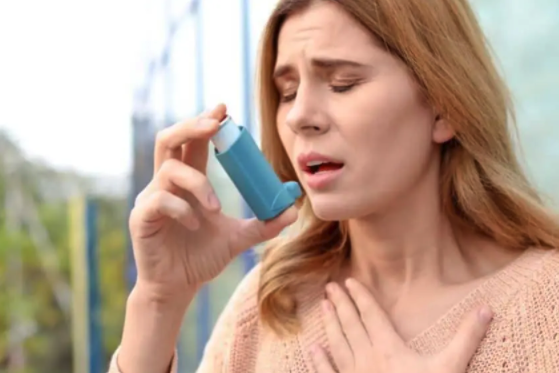Asthma is a chronic disease of the bronchi, which is accompanied by spasms and swelling of the mucous membrane. It is caused by inflammation of the airways and is often accompanied by coughing, shortness of breath, wheezing, and tightness of the chest.
Translated from Greek, asthma means “suffocation,” or “heavy breathing.” Indeed, this disease is characterized by constantly repeated attacks of suffocation.
Asthma, also called bronchial asthma, or asthmatic bronchitis is one of the most common chronic respiratory diseases worldwide and with the greatest increase in incidence in the last thirty years. It is estimated that one in twenty people suffer from asthma.
Asthma - causes
Asthma is caused by a complex relationship between genetic and environmental factors, such as: viral infections, allergens, and occupational agents that influence not only its onset but also its progression.
Among the internal causes of the disease, the following are distinguished:
- Respiratory system abnormalities
- Endocrine Disorders
- Weak immunity
External factors include:
- Working in an environmentally unfriendly place
- Smoking
- Allergies of various origins
- Stress
The most common factors that cause bronchial asthma in adults are allergies and smoking.
The “triggers” that often trigger crises are as follows:
- Viral infections (colds);
- Physical exercise;
- Exposure to allergens;
- Climate changes;
- Laughs;
- Irritating substances (smoke, pollution, or strong smells)
Types of asthma
There are three main forms of bronchial asthma.
- Allergic: Allergic asthma or atopic asthma is the most easily recognized asthma phenotype, which often begins in childhood – (childhood asthma) and is associated with past history and/or family of atopic diseases such as eczema, allergic rhinitis, or allergy to food or medication. The disease is caused by a specific allergen or group of allergens, which may include food, dust, animal hair, pollen
- Non-allergic: Some adults have asthma that is not associated with allergies. Patients with non-allergic asthma often do not respond as well to treatment with inhaled corticosteroids. This type of asthma is also called intrinsic asthma.
This type of asthma can develop against the background of chronic respiratory tract infections, hormonal changes, and the use of certain medications, such as aspirin.
- Mixed. This type of asthma shows the symptoms of the two previous asthma types.
Other related forms of asthma are:
- Late-onset asthma (adult)
- Asthma with fixed obstruction
- Asthma with obesity
- Occupational asthma (that is, acquired in the workplace can be induced or more often aggravated by exposure to allergens or other sensitizing agents at work)
- Exercise-induced asthma
Can asthma be cured?
Asthma has no cure, although asthma is a chronic condition and may occur with no symptoms for extended periods.
Good asthma control is characterized by the minimal presence of symptoms during the day and at night, little use of relief medication (Beta 2 agonist – salbutamol or terbutaline), absence of exacerbations, absence of limitations in physical activity, and normal function pulmonary (spirometry). This complete control may not be achieved in cases of severe (severe asthma) or moderate asthma.
So what are the present treatment methods?
Currently, the treatment of asthma is based on the control of symptoms, the need for treatment with bronchodilators in SOS (short-acting beta 2 agonists), and the improvement of respiratory function. These objectives are achieved when a balance is established between the prescription of drugs by the doctor and the correction of symptoms and respiratory function of the patient.
In this way, the doctor must adjust the therapy and inhalers to the patient’s preferences, and the patient should under no circumstances self-medicate, always following the action plan by the specialist physician such as those at Potomac Ear, Nose & Throat.
Drug treatment (medication) with low-dose inhaled corticosteroids (ICS) is highly effective in reducing asthma symptoms, preventing exacerbations, hospitalizations, and illness-related deaths.
Most inhalers can be used safely during pregnancy. It is important to alert the pregnant woman to the fact that asthma can get worse during pregnancy. The risk of an asthmatic attack immediately after delivery is high.
In allergic asthma, where allergen avoidance is difficult, the use of immunotherapy (vaccine for allergies) may be considered.
Asthma and coronavirus
The diagnosis of asthma also constitutes an individual part of the COVID-19 risk group, a disease caused by the new coronavirus (SARS-CoV-2). This is because of the virus lodges in the lung. Therefore, people with chronic respiratory diseases need to be careful with preventive measures against the disease.
References
Kimberly Holland and Laura Goldman, reviewed by Marc Meth, MD., What Do You Want to Know About Asthma? 2020.
Retrieved from: https://www.healthline.com/health/asthma
Daniel More, MD, Guide to Asthma, 2020.
Retrieved from: https://www.verywellhealth.com/asthma-overview-4582010

